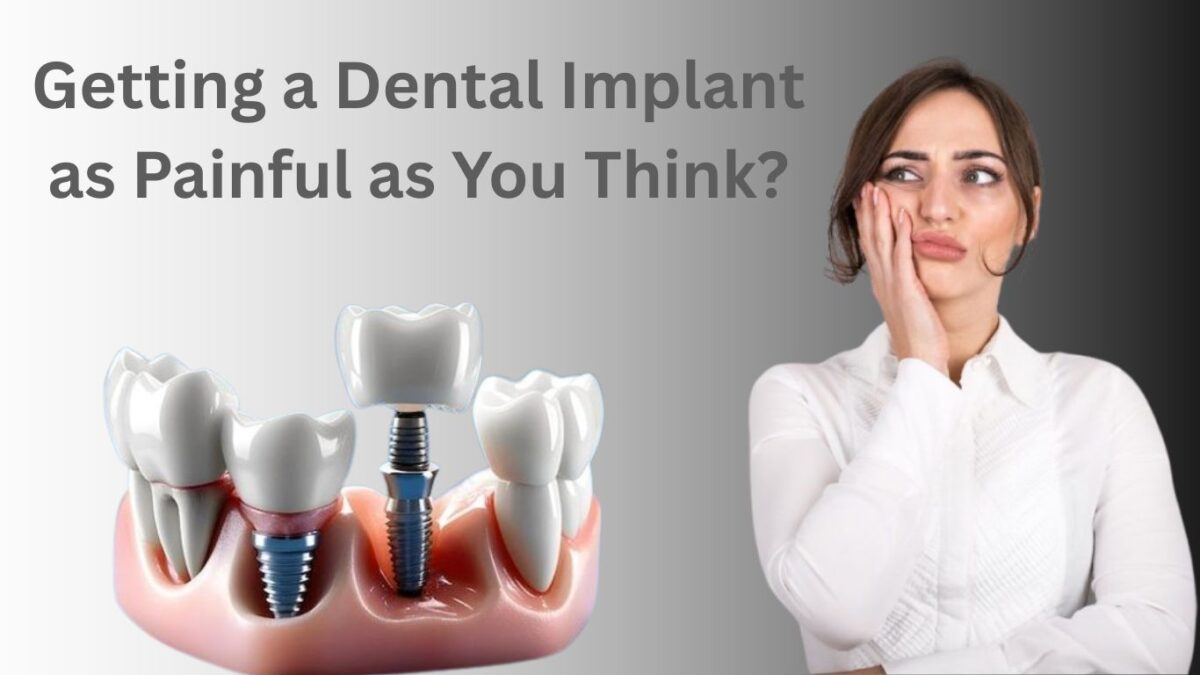Dental implant surgery provides a reliable and effective treatment option to replace missing teeth, but understandably most of the patients have concerns about pain involved in the procedure. In reality, dental implant surgery is carefully managed with a combination of sedation and local anesthesia to ensure that the treatment area remains numb throughout the procedure.
Although you may feel some minor discomfort or swelling during the recovery period; nonetheless, these effects can be easily managed by taking over-the-counter pain relievers and following normal post-operative care. In this blog, we shall go through the important aspects of dental implant surgery to understand how pain is controlled and provide practical advice to assist you in your recovery so you can approach the procedure confidently.
How Long Does Post-Implant Pain Last?
Immediately after dental implant surgery, you may experience numbness due to the local anesthesia, which disappears after a few hours. Once the numbness fades, there may be slight discomfort & swelling, which is a normal process of healing. For most patients, any pain associated with the procedure usually lasts around 7 to 10 days. In other instances, slight discomfort may persist for as long as two weeks, depending on healing rates and overall health, as well as the number of implants placed during the surgery.
It is important to understand that the soreness experienced after dental implant surgery is similar to what you would feel after any form of oral surgery. However, if you encounter severe pain or if your pain lasts longer than two weeks, it is recommended to seek consultation with your dentist for further assessment.
Managing Pain and Discomfort
Pre-operative care
Choose an experienced provider
Selecting a qualified and experienced implant specialist is important. Their expertise and knowledge can make the procedure easier & less painful, and they can help minimize pain and complications during and after the implant.
Ask questions
Communicate openly with your practitioner. Ask about the full procedure, how long recovery will take, what kind of aftercare is needed, and what precautions you need to take. Being well-informed helps you prepare and enables you to manage expectations.
Discuss pain management options
Speak with your dentist about ways to manage pain during & after the procedure. Options such as local anesthesia or sedation may be used depending on your level of comfort & medical history.
Follow all pre-operative instructions
Carefully follow any instructions provided before the surgery. This can involve taking some medications, fasting for a set period, and maintaining good oral hygiene. These steps lower the risk of complications and ensure the procedure goes as planned.
Post-operative care
Apply Cold Compresses
Place an ice pack on the outside cheek closer to the site of the implant for 10-minutes a few times a day. This reduces swelling and numbs minor discomfort.
Take Medications as Prescribed
Take painkillers or antibiotics according to your dentist’s instructions. Avoid missing doses or self-medication, which may slow down healing.
Follow Gentle Oral Hygiene
Gently brush your teeth with a soft-bristled toothbrush without touching the operated area during the initial days. Later on, rinse very gently with warm saltwater to prevent infection.
Stick to Soft Foods
For the initial days, consume soft, non-chewy foods such as ice cream, mashed potatoes, or soups. Refrain from hot, crunchy, or spicy foods to avoid irritation at the implant site.
Avoid Smoking and Alcohol
Smoking and alcohol consumption can slow healing & increase inflammation. You must refrain from these habits to reduce infection risks and ensure recovery.
Limit Physical Activity
Make sure your body gets plenty of rest. Avoid strenuous activity, heavy lifting, or bending over, as these will enhance bleeding or swelling.
When Should You Contact Your Dentist?
- Mild pain and swelling are to be expected following surgery. However, reach out to your dentist immediately if you experience:
- Severe or prolonged pain following the first week.
- Swelling, redness, or tenderness lasting longer than 10–14 days.
- Signs of infection (fever, pus, or unusual discharge).
- Bleeding that persists beyond 48 hours.
- Nausea or vomiting unrelated to medication.
- Pain on chewing or a loose implant
- These symptoms are rare but require immediate attention to rule out complications like infection or improper healing. Adhere to your aftercare regimen & practice oral hygiene to avoid these risks.
Conclusion:
Undergoing dental implant surgery could involve some discomfort, but with the expertise of a qualified dental professional, this can be effectively managed. At Smile in a Day, we specialize in delivering same-day dental implants throughout the UK, with a guarantee that our patients receive effective and comfortable care. Our professional team is dedicated to managing pain through careful treatment methods and we take time to clearly explain each step to you. If you’re considering dental implants & are worried about discomfort, we encourage you to visit us at Smile in a Day to talk about how we can ensure your experience is as comfortable as possible.
Contact
Get In Touch With Us To Schedule Your Appointment Today!

